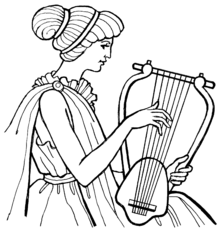lyre
See also: lyře
English

Etymology
From (deprecated template usage) [etyl] Ancient Greek λύρα (lúra, “lyre, a stringed instrument with a sounding-board formed of the shell of a tortoise”).
Pronunciation
- Lua error in Module:parameters at line 290: Parameter 1 should be a valid language or etymology language code; the value "UK" is not valid. See WT:LOL and WT:LOL/E. IPA(key): /ˈlaɪ.ə/
- Lua error in Module:parameters at line 290: Parameter 1 should be a valid language or etymology language code; the value "US" is not valid. See WT:LOL and WT:LOL/E. IPA(key): /ˈlaɪ.ɚ/, /laɪɹ/
- Rhymes: -aɪə(r)
- Homophones: liar, lier
Noun
lyre (plural lyres)
- (music) An ancient stringed musical instrument (a yoke lute chordophone) of Greek origin, consisting of two arms extending from a body to a crossbar (a yoke), and strings, parallel to the soundboard, connecting the body to the yoke.
- Any instrument of the same musicological classification; any yoke lute.
- A lyre-shaped sheet music holder that attaches to a wind instrument when a music stand is impractical.
- (obsolete) A composer of lyric poetry.
Related terms
Synonyms
- (a general class of instruments): yoke lute
References
- 2012. Kisir and Tanbura. Dahab Khalil and Artur Simon. Pg. 96.
- 2007. Origins and Development of Musical Instruments. Jeremy Montagu. Pg. 128.
Translations
stringed musical instrument
|
lyre-shaped music holder
|
See also
Further reading
- “lyre”, in Webster’s Revised Unabridged Dictionary, Springfield, Mass.: G. & C. Merriam, 1913, →OCLC.
- “lyre”, in The Century Dictionary […], New York, N.Y.: The Century Co., 1911, →OCLC.
Homophones
Anagrams
French
Pronunciation
Noun
lyre f (plural lyres)
- lyre
Categories:
- English terms derived from Ancient Greek
- English 2-syllable words
- English terms with IPA pronunciation
- English 1-syllable words
- Rhymes:English/aɪə(r)
- English terms with homophones
- English lemmas
- English nouns
- English countable nouns
- English words ending in "-yre"
- en:Musical instruments
- English terms with obsolete senses
- en:String instruments
- French 1-syllable words
- French terms with IPA pronunciation
- French terms with audio links
- French lemmas
- French nouns
- French countable nouns
- French feminine nouns
